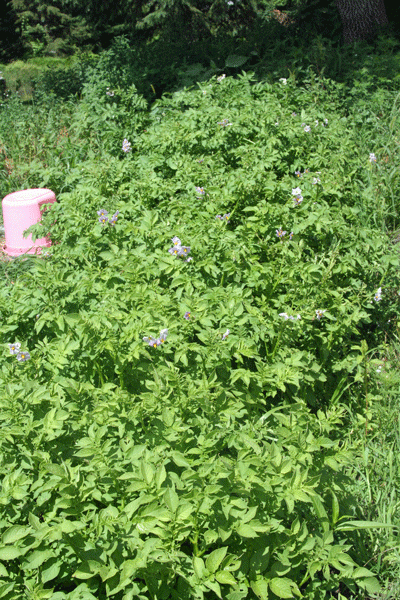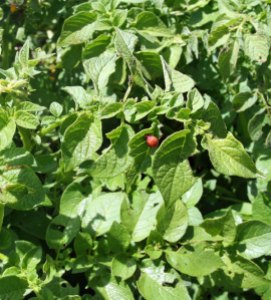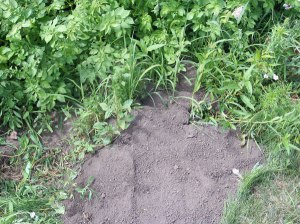 When I started gardening seriously a few years ago, a friend gave me a stack of books on organic gardening. I was especially interested in the one on preventing and treating for insects. I waited for bugs to appear and as soon as one showed up (the Colorado potato beetle) I went to the book.
When I started gardening seriously a few years ago, a friend gave me a stack of books on organic gardening. I was especially interested in the one on preventing and treating for insects. I waited for bugs to appear and as soon as one showed up (the Colorado potato beetle) I went to the book.
Boy was I disappointed! This handy “how-to” had no good advice. Over time, I’ve gotten used to the organic line: “If your soil is good and your plants are healthy, bugs won’t be a problem. Bugs only attack weak plants.” These books also usually advise: “Improve your soil before planting. If you still get bugs, spray a hose on them.”
Hmm. Every year so far I’ve had Colorado potato beetles, and I use “organic recommended” spinosad on them (Captain Jack’s Deadbug). It’s a heavily diluted spray and I apply it when I see beetles or eggs, about every two weeks in the prime of the potato season. I think it smothers the eggs and thus gets rid of them. I also have “hoppers,” little cricket-like insects, but they don’t eat much.
 This year things have been better than usual. Almost no beetles! But I did notice last week that one plant was really being ravaged by a bunch of them in the larval stage (I’ve not seen that before– just eggs and grown beetles). They are disgusting.
This year things have been better than usual. Almost no beetles! But I did notice last week that one plant was really being ravaged by a bunch of them in the larval stage (I’ve not seen that before– just eggs and grown beetles). They are disgusting.
What surprised me is they seemed pretty contained to this one plant. When I went out to spray this week, I approached from the other side. And I stepped right on this big pile of freshly dug dirt.
 And in my naiveté, my first thought was: “Oh, is some critter digging here because it wants to eat the bugs?”
And in my naiveté, my first thought was: “Oh, is some critter digging here because it wants to eat the bugs?”
I always hope the other maxim of organic gardening is true: “When you do have bad bugs, sometimes beneficial insects will come to your aid.” Hey, maybe this was some beneficial creature come to help out!
It was only that night in bed reading an article on heritage potato varieties (yeah, I know), that this sentence caught my eye: “That first year field mice ate most of the crop.” Wha? Oh no! That’s not a bug-eating creature! It’s a pocket gopher eating my potatoes!
There’s not much I can do, but when I dug up that plant, the potatoes were really too small to even interest a pocket gopher. I also found another tunnel near the compost pile about 10 feet from the potato bed. So it’s probably come to the area to stay.
I have no one to blame but myself, really. This year I’ve been quite lax about the weeds and also not allowed Steve to spray in the vicinity. There is plenty of “cover” for rodents in the high weeds to encourage them to live there with access to the garden. I’ll get on that!
Now it’s just a matter of whether the potatoes can grow big enough and I can harvest them before the pocket gopher gets them. I’ll also have Steve set a trap and see what happens.
The good news is that I planted a lot of potatoes and have already harvested a good bunch from the raised bed where I tucked in the extras. The two bags I planted look good, and I’m sure to get more than last year, when the drought and compacted soil really limited the crop.



Sorry but all I see is you trudging around the garden with a hose like Bill Murray in Caddy Shack…. the little guy gigging to Kenny Loggins and Steve making plastic explosive squirrels… oh boy….
I’m definitely muttering out there like Bill Murray in Caddy Shack… And Steve does know a little so,ethi g about explosives…
Sent from my iPad
Yesterday I posted a lengthy anti-pest post. It was focused on squash bugs but really applies to all “bad” garden insects (including potato beetles). They are all “organic” tips (we don’t use any chemicals/pesticides) but nothing about a hose or the soil or “weak” plants so you might like the tips! Here is the link: http://spygarden.wordpress.com/2013/07/31/ask-spy-garden-squash-bugs/
Thanks for the tips!